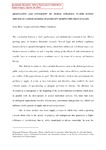Regulation and ownership of public utilities. Water supply service in a medium-sized spanish city during the Franco years

Use this link to cite
http://hdl.handle.net/2183/932Collections
- Investigación (FEE) [923]
Metadata
Show full item recordTitle
Regulation and ownership of public utilities. Water supply service in a medium-sized spanish city during the Franco yearsDate
2006-08Citation
10th. European Business History Association Conference. Copenhague, Agosto de 2006
Abstract
[Abstract] The relationship between business and institutional environment has fulfilled an increasing space in historians agenda. The aim of the paper is to investigate the impact of the new institutional framework created in Spain during the Franco Dictatorship (1939-75) on the success or failure of businesses, through a case-study. The scenario is a Spanish medium-sized city where the City council entrusted a private company the service at the beginning of the twentieth century, through franchising. However, after the Civil War (1936-39) the new political regime erected a new regulatory framework, which provoked a change in the attitude of the state towards public services. The central issue is that private management of water supply suffered from an increasing pressure, which aimed to revert the service to public ownership, particularly to municipal authorities. As matter of fact, this strategy was partially successful in the long term, since it gradually transformed the patterns of management of public utilities in Spain, and became municipal management dominant by the 1960s-1970s. The company experienced extraordinary difficulties which conditioned a more efficient management. The main responsible for this situation were: the autarkic context, the changes in the patterns of consumption, and the increasingly interventionist regulation. The text is divided into three main parts. Firstly, the relationship between water supply and the institutional framework from a theoretical point of view is considered. The main features of this service are also taken into account, since they conditioned the type of dominant firm in the past, as well as the main strategies applied in the developed countries. Secondly, the antecedents of regulation of water services in Spain and the new parameters of the institutional regime developed during the Franco years are specified. Finally, the laboratory for research has been the analysis of the water company of a Spanish city, aiming to determine the efficiency of the private management
Keywords
Public utilities
Water supply
Regulation
Water supply
Regulation





